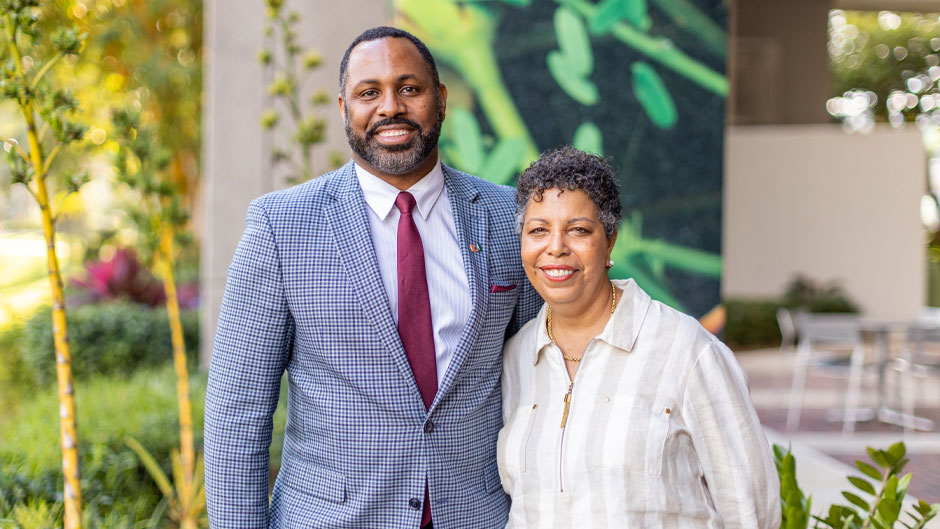The UStart@MiamiHerbert Entrepreneurship Immersion Program held its first residency—pushed to virtual because of the surging omicron variant—last week with students representing six historically Black colleges and universities (HBCUs) and other minority-serving institutions.
“If our communities are going to reach their economic potential, we have to be able to start sustainable businesses that can be profitable and offer opportunities for employment,” said EllenMarie McPhillip, associate dean of the School of Education and Human Development and a program co-lead.
The program’s longer-term focus, McPhillip explained, seeks to strengthen the University’s local footprint and to build the entrepreneurship talent base within Miami’s communities of color.
“As an outcome of the University’s racial justice initiative, it became clear that the business school, with its resources of alumni and faculty, could act as a nexus for mobilizing those assets to accelerate entrepreneurship in the Black and brown communities,” explained McPhillip, the former assistant dean of the business school’s undergraduate program until she recently shifted to her new role.
“As a city, Miami has taken off in terms of ‘start up’ culture, but that trend is not percolating and spreading through the Black and brown communities that live here,” she said.
With the energetic backing of business school Dean John Quelch, McPhillip and David Major, an associate professor of professional practice in management, began to develop the program more than 18 months ago.
“We started out focusing on doing this for the Miami community, but soon realized that if we opened up the lens and invited the HBCU community that we could have a much greater impact and then offer … a link to the booming Miami ecosystem of entrepreneurship,” McPhillip explained.
They designed UStart as a six-day, on-campus fully immersive residency for up to 40 students. But the ongoing challenges posed by the pandemic delayed the program’s start and ultimately limited the size of the first student cohort and prompted the move to a virtual residency.
The first two days enhanced academic skills pertinent to entrepreneurship. Curriculum then focused on experiential training and teamwork to accelerate students’ project ideas. On the final evening, students vied for $10,000 of prize money in a pitch competition. Juniors, seniors, and a few recent graduate students representing six colleges—Florida Memorial, Metropolitan State University (Saint Paul, MN), University of Maryland Eastern Shore, Savannah State University, University of the Virgin Islands, and Claflin University (Orangeburg, SC)—formed the initial cohort.
Major, who shared his insights early in the session, said the launch has been “amazing and fabulous” regardless of the move to virtual. He highlighted a first-day workshop that spurred students to adopt an innovative mindset.
“We want to tap into their creativity and really connect the head with the heart,” Major said. “An innovative mindset is essential, and we want to do is not just give them the tools, but also to help develop this mindset,’’ he pointed out.
“We want individuals who care about their communities and who consider the social impact [of their entrepreneurial projects],” he said, adding, “those can certainly be ideas for for-profit organization that have a positive impact.”
McPhillip addressed would-be critics who might question how much can be taught in a weeklong session.
“The fact is that for many of these students this will be the first time that someone has said to them ‘you don’t need to go to work for someone else if you have a decent idea. Even if you’re working for Starbuck’s or IBM, your side hustle can be something that takes you to a different opportunity space,’ ” she said.
University speakers included Laurie Silvers, chair of the Board of Trustees; Susana Alvarez, senior lecturer of entrepreneurship; Imelda Moise, associate professor of geography and sustainable development; and Charmel Maynard, University treasurer, among others. University Libraries The Creative Studio and The Launch Pad shared vital resources.
Executive mentors representing a variety of ages and professional backgrounds—real estate, financial services, retail, and early education—worked with students throughout the week.
UStart will support one cohort a year for now, yet Major perceives a more ambitious schedule, possibly hosting new sessions during academic breaks.
“Just like a startup, the program in its compressed format requiring undivided attention is designed to be scalable,” he said. “With the ongoing mentoring, we could run it multiple times a year.”
Students will continue to receive mentorship and advising support following the program and are expected, as part of their commitment, to offer a workshop or training at their own university based on their learning experience.
“The hope is that they will have learned so much from this experience that their enthusiasm, energy, and knowledge will excite the next cohort,” McPhillip said.

